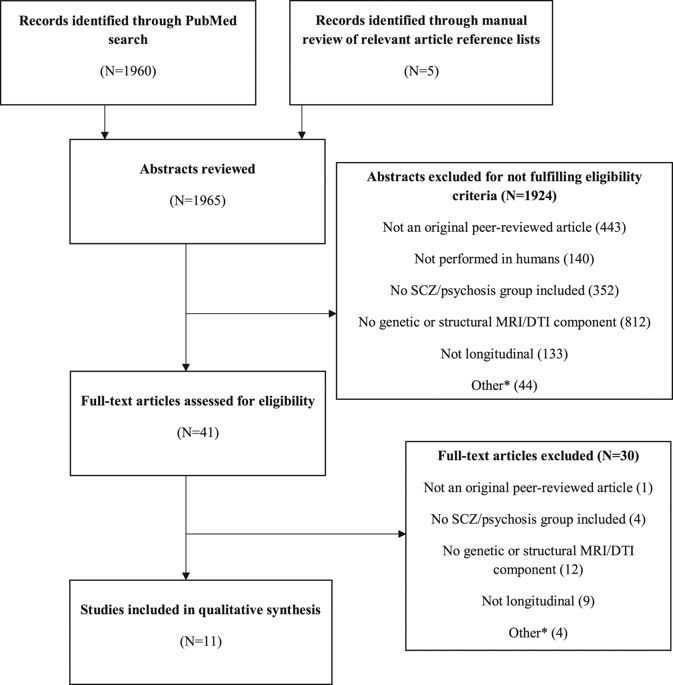npj Schizophrenia ( IF 5.7 ) Pub Date : 2017-11-01 , DOI: 10.1038/s41537-017-0036-2 Julia H. Harari , Covadonga M. Díaz-Caneja , Joost Janssen , Kenia Martínez , Bárbara Arias , Celso Arango

|
Evidence suggests that genetic variation might influence structural brain alterations in psychotic disorders. Longitudinal genetic neuroimaging (G-NI) studies are designed to assess the association between genetic variants, disease progression and brain changes. There is a paucity of reviews of longitudinal G-NI studies in psychotic disorders. A systematic search of PubMed from inception until November 2016 was conducted to identify longitudinal G-NI studies examining the link between Magnetic Resonance Imaging (MRI) and Diffusion Tensor Imaging (DTI)-based brain measurements and specific gene variants (SNPs, microsatellites, haplotypes) in patients with psychosis. Eleven studies examined seven genes: BDNF, COMT, NRG1, DISC1, CNR1, GAD1, and G72. Eight of these studies reported at least one association between a specific gene variant and longitudinal structural brain changes. Genetic variants associated with longitudinal brain volume or cortical thickness loss included a 4-marker haplotype in G72, a microsatellite and a SNP in NRG1, and individual SNPs in DISC1, CNR1, BDNF, COMT and GAD1. Associations between genotype and progressive brain changes were most frequently observed in frontal regions, with five studies reporting significant interactions. Effect sizes for significant associations were generally of small or intermediate magnitude (Cohen’s d < 0.8). Only two genes (BDNF and NRG1) were assessed in more than one study, with great heterogeneity of the results. Replication studies and studies exploring additional genetic variants identified by large-scale genetic analysis are warranted to further ascertain the role of genetic variants in longitudinal brain changes in psychosis.
中文翻译:

基因变异与精神病纵向脑结构变化之间的关联:纵向神经影像遗传学研究的系统综述
有证据表明,遗传变异可能会影响精神病性脑部结构的改变。纵向遗传神经影像(G-NI)研究旨在评估遗传变异,疾病进展和脑部变化之间的关联。对于精神病性疾病的纵向G-NI研究的评论很少。从开始到2016年11月对PubMed进行了系统搜索,以鉴定纵向G-NI研究,以检查基于磁共振成像(MRI)和基于弥散张量成像(DTI)的大脑测量与特定基因变体(SNP,微卫星,单倍型)之间的联系)患有精神病的患者。十一项研究检查了七个基因:BDNF,COMT,NRG1,DISC1,CNR1,GAD1和G72。这些研究中的八项报道了特定基因变异与大脑纵向结构变化之间的至少一种关联。与纵向脑容量或皮质厚度减少相关的遗传变异包括G72中的4标记单倍型,NRG1中的微卫星和SNP,以及DISC1,CNR1,BDNF,COMT和GAD1中的单个SNP。基因型与进行性脑部改变之间的关联最常见于额叶区域,其中五项研究报告了显着的相互作用。显着关联的效应大小通常为中小幅度(Cohen's 基因型与进行性脑部改变之间的关联最常见于额叶区域,其中五项研究报告了显着的相互作用。显着关联的效应大小通常为中小幅度(Cohen's 基因型与进行性脑部改变之间的关联最常见于额叶区域,其中五项研究报告了显着的相互作用。显着关联的效应大小通常为中小幅度(Cohen'sd <0.8)。在一项以上的研究中,仅评估了两个基因(BDNF和NRG1),结果具有很大的异质性。复制研究和探索通过大规模遗传分析确定的其他遗传变异的研究有必要进一步确定遗传变异在精神病纵向脑部改变中的作用。





















































 京公网安备 11010802027423号
京公网安备 11010802027423号